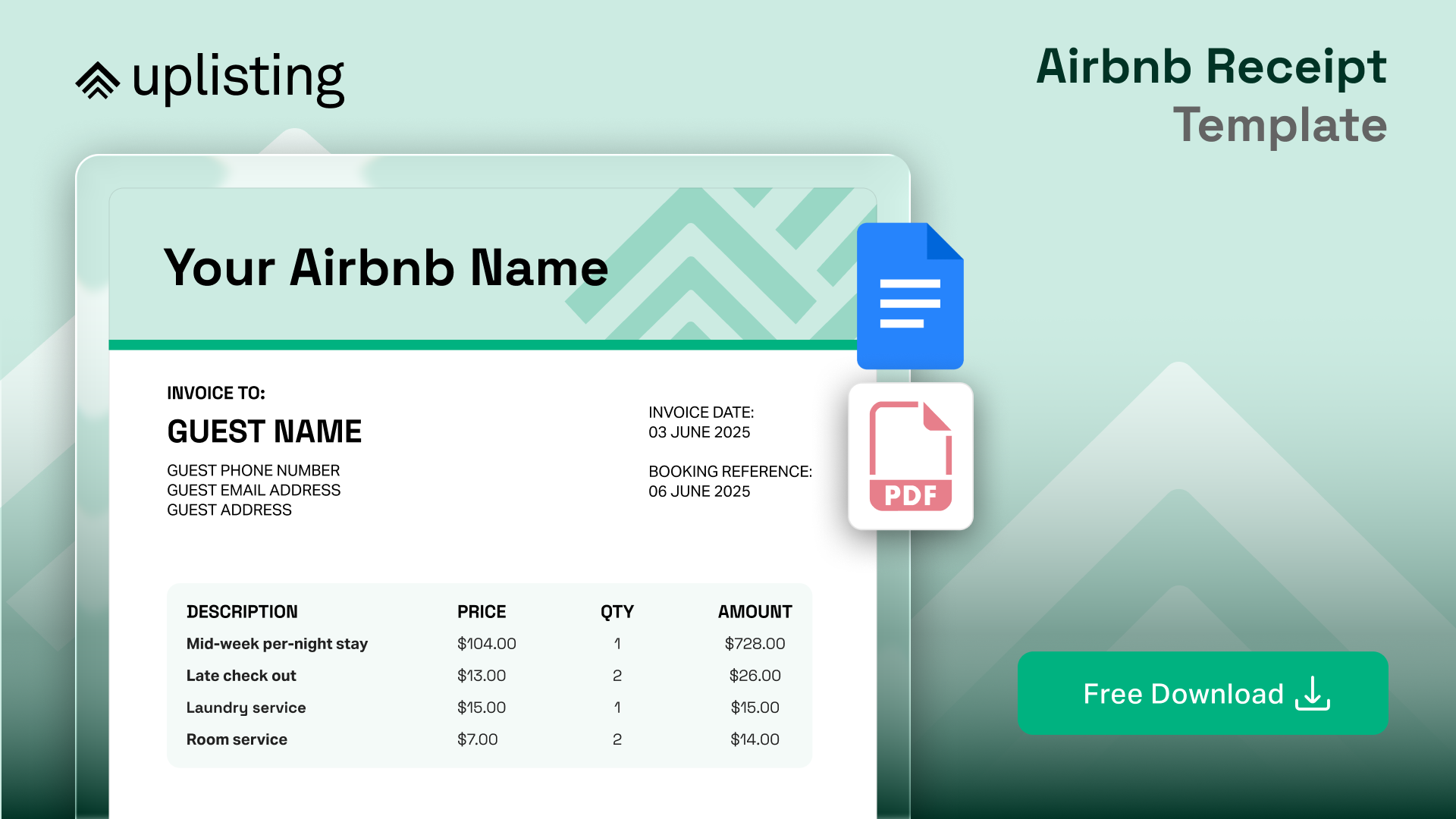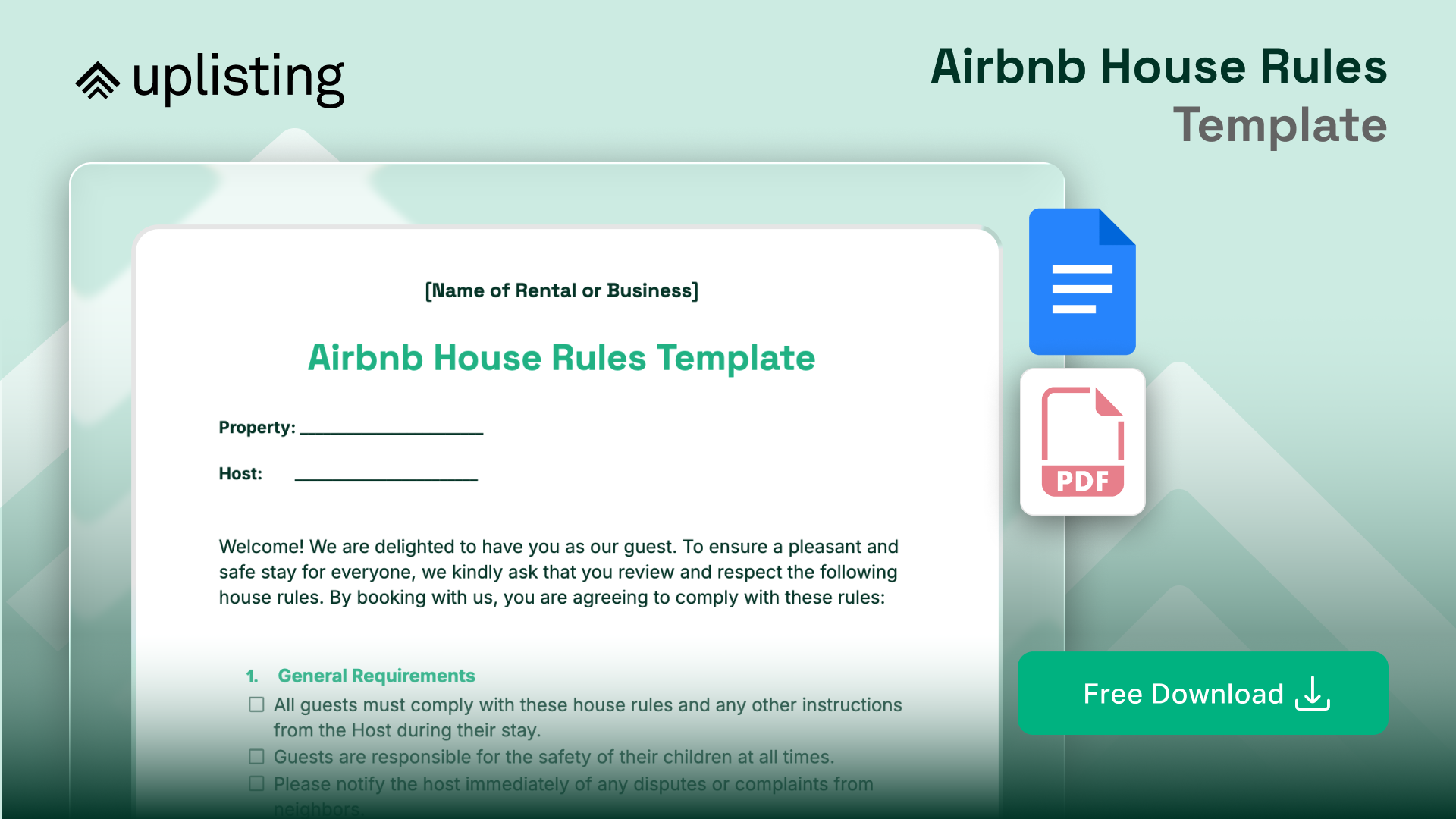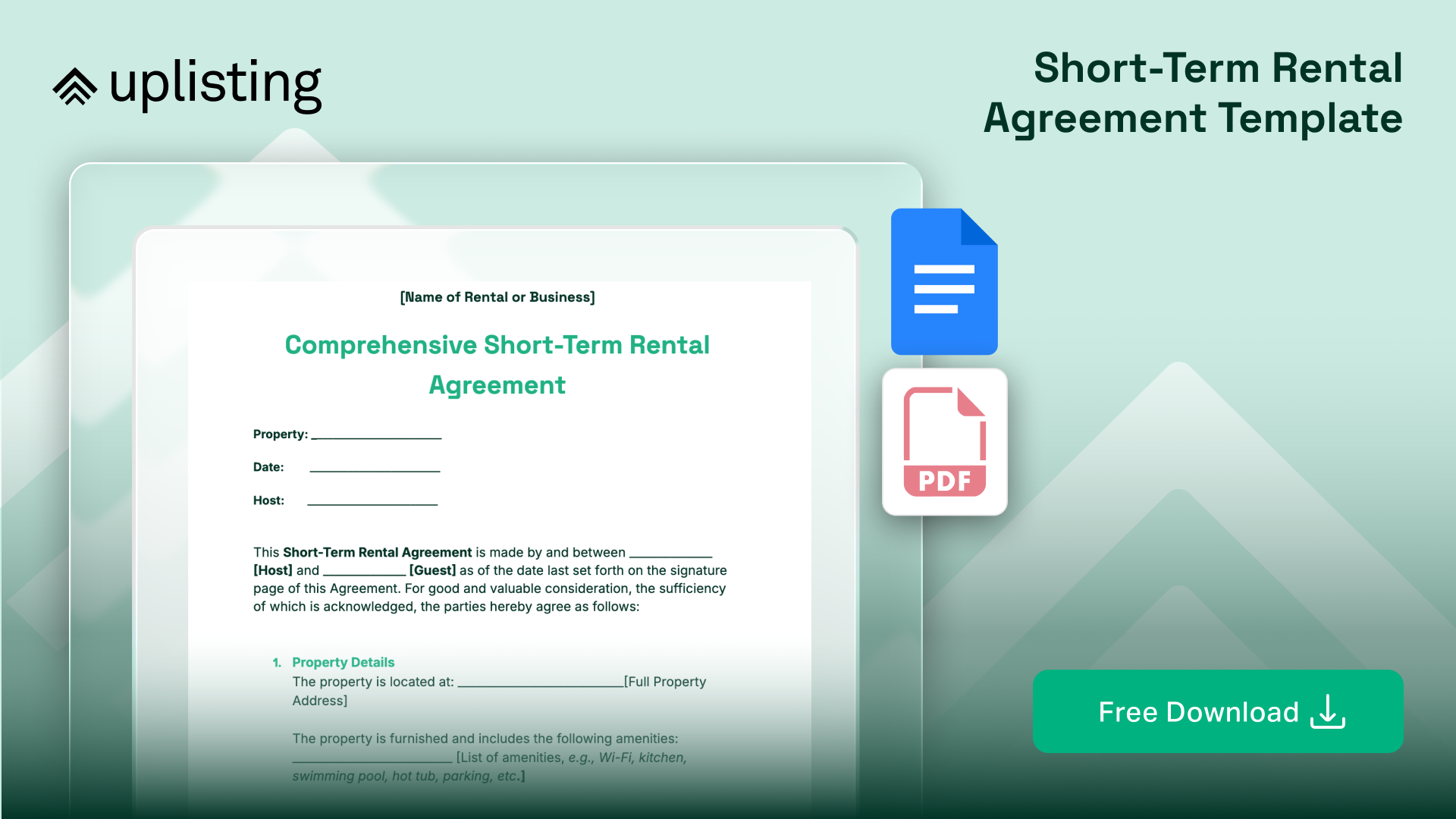Key Takeaways
Clear, friendly communication is one of the biggest drivers of 5-star reviews when it comes to short term rentals.
Timely responses and replies to messages prevent confusion and improve the guest experience.
Personal touches in messaging build trust and rapport, so it's worth spending the time when you can.
Here’s the thing about Airbnb reviews: guests often mention your communication before they mention the bed, the shower, or even the view.
Yet, according to AirDNA, just 20% of guests receive more than two messages from their host during their entire stay, from booking through checkout. That silence leaves plenty of room for doubt, missed details, and reviews that could have been stronger.
Think back to the last time you travelled. If you messaged a host about check-in and didn’t hear back for hours, chances are you started wondering if you’d even get inside. On the flip side, a friendly message waiting for you after a long flight can make you breathe easier straight away. That’s the power of good communication; it sets the tone before a guest ever unpacks their bag.
In this blog, we’ll go through 6 Airbnb guest communication tips that help you build trust, avoid mix-ups, and collect better reviews. They’re simple changes, but they make a big difference in how guests remember their stay... And how they talk about it afterwards.
Why Guest Communication Impacts Reviews
When guests think back on their stay, they remember more than the furniture or the décor.
Your guests often recall how easy it was to get in touch, how quickly questions were answered, and whether they felt supported throughout the trip. Communication shapes the overall experience in ways that go far beyond the property itself.
Slow replies create doubt. A guest waiting hours for a message may start worrying about check-in details, or if help will be available if something goes wrong. That uncertainty lingers, and it often shows up later in a review. On the other hand, timely and thoughtful replies create confidence. Guests feel like someone is paying attention, which sets a positive tone before they even arrive.
Reviews reflect this. Many guests forgive small hiccups (like a missing kitchen item or a tricky thermostat) when they know their host is responsive and approachable. Strong communication reassures them that any problem will be dealt with quickly. Poor communication does the opposite, overshadowing even the best-located or best-decorated listing.
In the end, reviews are written as much about how guests felt as they are about what they saw. Clear, reliable communication is the thread that ties the whole experience together, and it often makes the difference between an average review and a great one.
So, where to start when it comes to improving guest comms? Let's take a look at 5 tips from our experts.
So automatic, you won’t know what to do with yourself
Put my rentals on autopilot
It’s simple to automate repetitive tasks with Uplisting's short-term rental software. You’ll save hours every week and eliminate human error. Go ahead — take some time off.
Tip 1: Respond Quickly to Inquiries
Fast replies do more than just reassure guests, they push listings higher in Airbnb search results.
The platform prioritizes hosts who respond quickly, so each minute counts. Quick replies lead to more visibility, more clicks, and more bookings. In competitive markets, where travelers skim through listings at lightning speed, a slow reply can hand the reservation to someone else.
Use templates, but keep the tone human
Templates save time when the same questions keep popping up: check-in instructions, Wi-Fi, parking, pet policies. But robotic replies turn people off fast. Start with a basic script, then add real personality with small tweaks.
Template: “Hi [Guest Name], thanks for reaching out! Check-in is anytime after 3 PM, and there’s free street parking out front. Let me know if you have other questions.”
Tweak: Drop in a tip like, “There’s usually a spot open across from the coffee shop on the corner—it’s the quietest part of the block.”
Now the message sounds like it came from someone who knows the neighborhood well, not a system auto-firing answers.
Be clear on when you’re not available
You won’t always be glued to your phone, and that’s fine. Just let guests know when they’ll hear from you.
A simple auto-reply like, “Got your message! I’ll respond within the hour,” does the job. Silence, on the other hand, creates tension. Guests start wondering if they picked the wrong host.
Most frustrations around communication come down to uncertainty. Even a quick heads-up can prevent negative reviews. A little clarity goes a long way, especially when everything else is already running on a tight schedule. Among the most practical Airbnb guest communication tips, setting expectations upfront earns trust without adding more to your workload.
Tip 2: Set Clear Expectations Before Arrival
Most guest complaints don’t come from bad properties—they come from surprises. A stuck door lock, traffic noise, or no mention of where to park can all lead to frustration. None of these issues are major on their own, but when guests don’t know what to expect, they feel caught off guard. That’s when reviews turn sour.
Check-in instructions need to be clear and detailed. Walk guests through the process, step by step. Include photos if the entry system is tricky—keypads, side gates, or lockboxes with quirks all benefit from a visual guide. Let guests know exactly when access codes activate and point out anything that might trip them up, like a steep staircase or hard-to-spot signage. A smooth arrival builds trust right away.
House rules are a part of the stay. Be direct. If the home isn't suited for parties, say so early. Set quiet hours and include them in your pre-arrival message. Clarify if there are exterior cameras or a noise sensor inside. Not because you're being strict, but because surprises cause issues.
Clarify the must-know policies
Some rules matter more than others. Don’t assume guests will read between the lines, clearly spell out what they really need to know.
Pets: If you don’t allow animals, say it clearly. If you do, list any conditions like size limits, fees, or crate requirements. Avoid vague phrases like “pet-friendly” without explaining what that actually means.
Parking: Be specific. Say whether parking is on the street, if a permit is needed, or if the driveway is shared. Mention spots guests should avoid to prevent tickets or neighbor complaints.
Noise: If the home shares walls or is in a quiet neighborhood, set expectations. Let guests know if sound carries easily or if neighbors value peace and quiet. Mention if you’ve installed noise sensors, and explain why they’re there.
The gap between what guests expect and what they get is where problems start. When you explain the setup before check-in, you avoid confusion and set everyone up for a better stay.
Enjoy the confidence & focus you need to scale your vacation rental business
Book more while doing less
With a reliable VRM solution you can trust, Uplisting can help you grow your business without wasting time on double bookings, unhappy guests, upset clients and worrying what could go wrong next.
Tip 3: Personalize Your Welcome Message
A guest can spot a copy-paste message in seconds. A few quick adjustments turn a standard note into something thoughtful, without adding more to your to-do list.
Start with the guest’s name. It’s simple but powerful. “Hi Sarah” feels like a real conversation. “Hi there” doesn’t. If a guest shares why they’re visiting, like a wedding, conference, family trip, mention it directly. Saying “Hope the anniversary dinner goes well!” feels genuine. Saying nothing makes the message forgettable.
Add a local tip, too. Skip the obvious spots and recommend places locals actually use. A quiet coffee shop around the corner. A pizza place open past 10. A running trail five minutes from the front door. When a guest brings kids, mention a nearby playground or family-friendly diner. When someone’s in town for work, suggest a café with strong Wi-Fi and plenty of outlets.
Keep the message short. Friendly doesn’t mean wordy. A few lines with real intent go further than a long message filled with fluff. Here’s what tends to land well:
Reference their stay: “Hope the wedding goes smoothly—weather looks perfect.”
Call out one solid local spot: “If you’re hungry after check-in, Taqueria El Gallo is open late and two blocks away.”
Offer clear support: “Text if anything comes up—I’m nearby if you need help.”
Among Airbnb guest communication tips, this one takes the least time and builds the most goodwill. A small personal touch upfront sets the tone for the rest of the stay.

Tip 4: Check In During the Stay
A well-timed message during the stay can turn a forgettable trip into a five-star memory.
A quick check-in shows you’re paying attention without hovering. The best time to message? Not right after they walk in, and not when they’re already packing. For a weekend booking, the morning after check-in works well. For longer stays, halfway through gives guests time to settle in and notice anything they need.
Fix problems fast—even if they’re minor
When a guest replies with a request, speed matters. Whether the Wi-Fi is acting up, the towels ran short, or they can’t figure out the thermostat, fast follow-up makes the issue feel smaller. Delayed replies send the opposite message, like you’re not paying attention or don’t care.
Skip generic apologies. Be clear and specific. “Thanks for flagging it—I’ll drop towels off by 2 PM” works better than “Sorry for the inconvenience.” Guests want to know what’s happening and when it’ll be fixed. That kind of clarity builds trust and shows you take their stay seriously.
Pay attention to tone and timing
Not every guest wants a conversation. Some just want a place to sleep and a quiet exit. Others ask about dinner spots before they’ve even landed. Your job is to meet them where they are. One-word replies usually mean they’re not looking for local tips. A question about hiking trails? That’s an open door.
Short-term rentals don’t have front desks or lobby staff. Every message shapes the guest experience. The best Airbnb guest communication tips aren’t about saying more—they’re about saying the right thing, at the right time, with the right tone. Sometimes, the smartest move is to stay quiet and let the guest lead.
Create 5-star guest experiences
Give your guests unforgettable experiences
With Uplisting, you can send the right messages at the right time on all booking sites. Read and respond to guest messages in a single, unified inbox — whether you’re at the office or on the go.
Tip 5: Provide a Smooth Check-Out Experience
Guests remember the last part of their stay just as clearly as the first. A stressful exit, unclear instructions, or unanswered questions can undo positive moments from earlier in the visit. On the other hand, a smooth check-out makes people feel taken care of.
Send clear, short check-out instructions the night before departure.
Mention the time: “Check-out is by 11 AM.”
List simple steps: “Please lock the door and return the key to the lockbox.”
Keep it minimal: No need to ask for vacuuming or dishwashing unless it’s absolutely necessary.
If the schedule allows, offer a late check-out window. Even 30 extra minutes can make a big difference for a guest with a slow morning or late flight. If the calendar is tight, set boundaries clearly but politely. Guests appreciate knowing what’s possible without having to ask twice, or guess.
Right after check-out, send a thank-you message. A short note shows you noticed their stay and appreciated them. Mention something personal if you can, like how tidy they left the space or how responsive they were.
Tip 6: Follow Up After Departure
Check-out isn’t the end of the conversation.
A quick message after guests leave can lead to more reviews, repeat bookings, and stronger guest relationships.
Offer a reason to come back
Guests who had a good stay often just need a nudge to return. A quiet offer, like “Here’s 10% off your next visit,” gives them a reason to book again without sounding pushy. Personalize it when you can, mention a favorite local spot they enjoyed, or a season they said they’d like to return for.
Even a small incentive helps your place stand out. In markets where every listing looks similar, familiarity and a clear benefit make the choice easier.
Stay on their radar, without being annoying
Some guests want to return, but just forget. A short message tied to local events, holidays, or seasonal reopening dates can be enough to bring them back. Skip the marketing language. Use a simple note, like “We’re opening up spring weekends if you’re looking for a quick getaway,” and keep it casual.
Consistent follow-up gives guests a reason to stay connected and remember you when they’re ready to book again. Among Airbnb guest communication tips, this one’s often skipped—but it’s the easiest way to turn one-time guests into regulars.
Save yourself from your inbox
Automate with Uplisting
Automated guest messages keep your guest informed from booking through to check-out. They’re designed to answer questions before they arise, saving you time whilst keeping your guests happy.
What to Remember About Airbnb Guest Communication
Exceptional guest communication is about being intentional. From first contact to final follow-up, each message plays a role in shaping the guest experience. Clear expectations, personalized touches, and timely check-ins all build trust and reduce friction, which translates directly into better reviews and higher retention.
By implementing these six communication strategies, you can proactively prevent issues, boost your ratings, and create a consistent guest experience across every stay. When communication runs smoothly, your operations become easier to manage, and your guests are more likely to return.
Looking to take the next step when it comes to guest comms? Uplisting is the number one tool that five-star hosts rely on. With just one platform, you can automate guest messaging, centralize communication across platforms, and deliver effortlessly excellent stays from booking to check-out. Try it out now.
FAQs About Airbnb Guest Communication
What is the best way to handle guest complaints?
Start with a quick reply, even if you don’t have the fix yet. A message like “Thanks for flagging this—I’ll check and update you by 3 PM” shows you're on it and keeps tension from building. Guests want to feel like someone is paying attention, not waiting on a copy-paste apology.
Keep your tone calm and direct, especially when the complaint feels minor or avoidable. A dripping faucet might not seem like a big deal, but ignoring it signals you’re not paying attention. Staying polite and focused gives guests confidence that you care even when the issue is small.
How do automated messages affect the guest experience?
Automation helps guests get the right details without delay. Instead of leaving them guessing about check-in or Wi-Fi, scheduled messages deliver what they need, when they need it. That kind of consistency cuts down on confusion and saves everyone time.
You don’t have to sound like a robot to stay efficient. Add a guest’s name, mention their reason for visiting, or include a quick local tip. Small changes make automated messages feel more personal without adding more to your plate.
Do I need to message guests mid-stay?
For longer stays, a quick check-in message halfway through helps catch small problems before they turn into big complaints. A guest might not speak up about a missing towel or a stuck window unless you ask. A short note shows you’re paying attention without hovering.


















.png)

